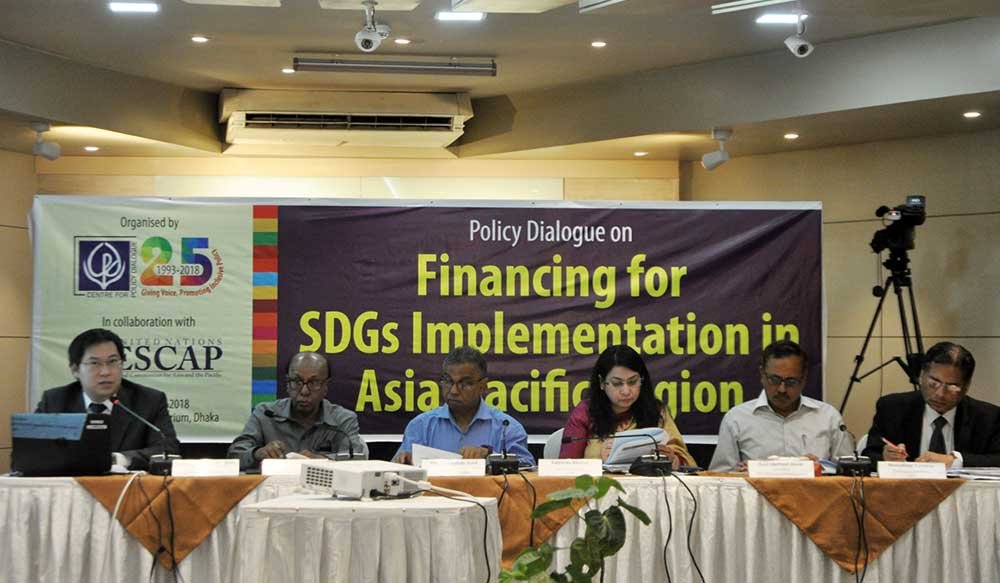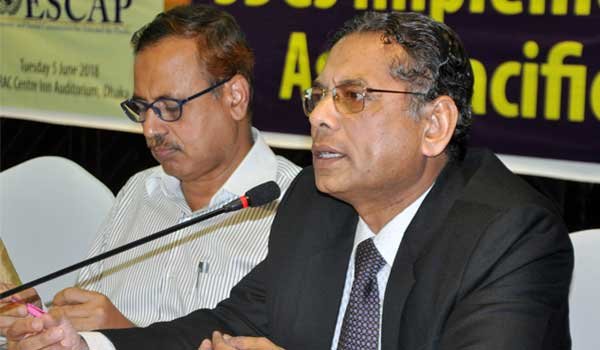
Asia and the Pacific region’s continued economic growth is anticipated to remain steady. However, the prospects for the least developed countries including Bangladesh remain a concern as they have inherent vulnerabilities and exposure to natural disasters. The weakness of public finance in these countries is distinctive as the countries’ resource mobilisation remains low despite structural reforms designed to enhance tax collection. In this backdrop, the United Nations Economic and Social Commission for Asia and the Pacific (UNESCAP) has published its Economic and Social Survey of Asia and the Pacific 2018 emphasising that the policymakers must work to implement the 2030 Agenda for Sustainable Development to ensure that the quality of economic growth is inclusive and sustainable.
The report was presented by Mr Vatcharin Sirimaneetham, Economic Affairs Officer, Macroeconomic Policy and Financing for Development Division, UNESCAP, Bangkok, at a dialogue titled Financing for SDGs Implementation in Asia-Pacific Region.
CPD, in collaboration with UNESCAP, organized the dialogue on 5 June 2018. Mr Md. Abul Kalam Azad, Principal Co-coordinator (SDG Affairs), Prime Minister’s Office, was the Chief Guest and Mr Kazi Shofiqul Azam, Secretary, Economic Relations Division, Ministry of Finance, Government of Bangladesh, was the Special Guest at the dialogue. Dr A B Mirza Azizul Islam, former Advisor to the Caretaker Government was the Guest of Honour and Professor Mustafizur Rahman, Distinguished Fellow, CPD, was a discussant. The dialogue was chaired by Dr Fahmida Khatun, Executive Director of CPD.
Mr Sirimaneetham’s presentation focused on global and regional economic trends and policy challenges, mobilization of finance from various sources and lessons learned with regard to resource mobilisation.
Dr Mustafizur Rahman highlighted the rise of trade protectionism despite higher global economic growth. He referred to South-South cooperation, blended finance, public bond and taxation as the major source of finance. He also emphasised on the quality of governance.
Dr Fahmida Khatun pointed out that finance is the cornerstone of SDGs implementation. Bangladesh will need an additional USD 928 billion during 2017-30 to implement the SDGs. Therefore, financing for SDGs should be mobilized from various sources, including traditional and non-traditional sources.
Dr Mirza Azizul Islam observed that Bangladesh’s tax-GDP ratio is notably low, even lower than that of Nepal. He suggested to progressively increase reliance on direct trade and make prudent borrowing. Dr Islam also recommended to increase Bangladesh government’s capacity to spend in a productive manner.
 Among the speakers from the audience, President of Metropolitan Chamber of Commerce and Industries Barrister Nihad Kabir mentioned that countries of the Asia Pacific region can mobilise fund from non-traditional sources. However, the private sector lacks information on how to access those funds, she added.
Among the speakers from the audience, President of Metropolitan Chamber of Commerce and Industries Barrister Nihad Kabir mentioned that countries of the Asia Pacific region can mobilise fund from non-traditional sources. However, the private sector lacks information on how to access those funds, she added.
The Resident Representative of the International Monetary Fund Mr Ragnar Gudmundsson highlighted on having clear investment policy, strong public finance mechanism and improving the quality of public expenditure. He also emphasised on export diversification and enhancement of productivity of the economy.
Dr Debapriya Bhattacharya, Distinguished Fellow of CPD, said the world has more than enough resources for every country, but the problem is that the global financial architecture and the global development cooperation are in a shambles. There should be systemic reform to reduce illicit financial flow and increase overseas development assistance, he observed.
The Chief Guest Mr Md Abul Kalam Azad emphasised on finding innovative ways to attract resource and diversify export. He highlighted a number of positive changes in Bangladesh economy. He mentioned that though the share of revenue in GDP is not so impressive, the size of budget has increased manifold over the years. Investors are showing interest to invest in Bangladesh. Mr Azad informed the audience that in order to improve efficiency within the government, the Annual Confidential Report of government employees will be replaced by the Annual Performance Report.
Mr Kazi Shofiqul Azam, the Special Guest of the dialogue, reiterated that the cost of SDGs implementation is very high. The government of Bangladesh is exploring all sources to mobilise fund, he added. These include public, private, public-private partnership, foreign direct investment, grants and non-government organisations. Mr Azam reemphasised on capacity development and utilisation of fund.


